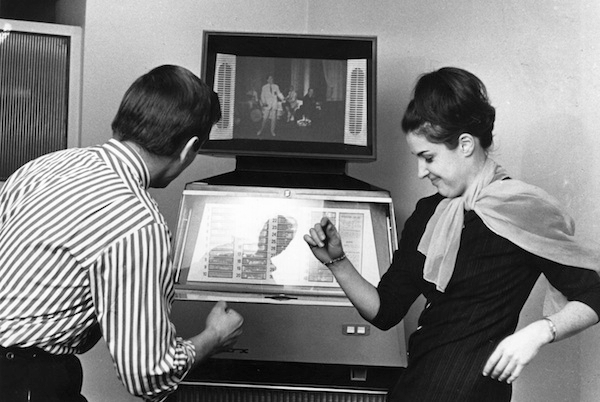‘Young people under 16 don’t want to listen to the radio unless there’s a picture to look at,’ said Annie Nightingale on the Today programme. It was Saturday morning and I was only half listening. But this woke me up sharpish. Nightingale was talking to Sarah Montague about the new ‘Harlem Shake’ craze on YouTube but she also enthused about the new Sunday-night Radio 1 show hosted by Dan and Phil, whose ‘visualised’ radio show I’ve already discussed. She’s right, of course; how can we expect young people brought up on the web, and glued to their iPhones and iPads, to be satisfied with listening to words or music or conversation without a screen to look at, filled with hectic moving images? But once pictures are also available as you listen, is there any chance that radio as we know it, as a purely aural experience, will still be going strong in the 2030s?
Perhaps surprisingly, radio survived the initial impact of TV in the 1960s, if not unscathed at least with relatively decent audience figures for the BBC stations. Is it now, though, succumbing to the unassuageable greed of the internet? The audience numbers published by Rajar suggest that listening numbers are increasing. But how are they listening and what to? 6 Music, which has grown phenomenally in the past year or so (ever since it was threatened with the chop), is digital-only, designed for the gadget-obsessed generation, and probably mostly listened to online. In a few years’ time will radio only be heard via a smartphone or laptop screen? If so, once a screen is there, won’t we expect it to be filled with pictures? And if so how will this affect our ability to take in stories, ideas, by word alone?
If, for instance, there had been an accompanying ‘visualisation’ for the poet Tony Harrison’s reading of his controversial verse ‘V’ on Radio 4 on Monday night, would we have experienced the poem differently? Would it have been more, or less, shocking?
Intriguingly, the poem was given its first public reading in 1987 not on radio, as you might expect for a poem that depends for its effects on the sound of words, their rhythms, cadences and often brutal aural impact, but on the upstart TV station Channel 4. No one else would touch it, ostensibly terrified by all the swear-words — the reporter in the Sun counted 90 expletives in 35 minutes. The powers that be were probably much more worried about its political intent. Harrison wrote the poem in anger after discovering that his parents’ gravestones in Beeston, on the outskirts of Leeds, had been desecrated with spray-canned graffiti. But Harrison’s a poet so he quickly moves from his personal feelings to an investigation of why he’s so angry, and why the ‘skins’ who’ve beaten up the graveyard are so disassociated. Britain is in the grip of the miners’ strike, soccer violence and racial tensions. Harrison does not disguise his anti-government socialist sympathies. Chief among his critics was the Tory MP Gerald Howarth, who tabled an early day motion in the House of Commons in an attempt to stop the screening of ‘V’.
On Radio 4, 25 years later, the insistent repetitions of the f-word, c-word and n-word are discomfiting but no longer very shocking. We’ve heard much worse. Harrison at one point in the poem finds himself in conversation with the unemployed Leeds United fan who has aerosoled his Mum and Dad’s tomb. How could he have written this without the demotic swearing? It’s not what we might like to think of as ‘art’ but it’s very believable, and still very raw, straight from the gut.
What’s much more surprising is that it was still thought necessary to broadcast Harrison’s reading late at night, buried in the schedule and emblazoned with warnings about its linguistic pornography. It’s as if we’re still running scared of the power of words and while quite happy to listen to gruesomely graphic sex scenes in the middle of the day would rather not have Harrison’s blunt word-portrait shoved in our ears.
On Wednesday night the BBC World Service and British Council announced the winners of this year’s International Radio Playwriting Competition. Two winners, Angella Emurwon from Uganda and Janet Veronica Morrison from Jamaica, representing the best play written in English as a first language and the best play by a writer for whom English is a second language, will be given the chance to hear their plays broadcast on air. Nothing unusual, you might think. But plays on the World Service, which used to be a regular weekly event, are now a thing of the past. Only the existence of this prize, which has been going for 23 years and has funding and support from outwith the BBC, is keeping drama on air on the BBC’s global network.
The number of radio plays across all the networks has been going down bit by bit in the past few years. Yet drama is the lifeblood of British radio. It’s what makes our radio so different. Radio drama saw off its TV rival, but will it survive the insatiable advance of touchscreen technology?






Comments